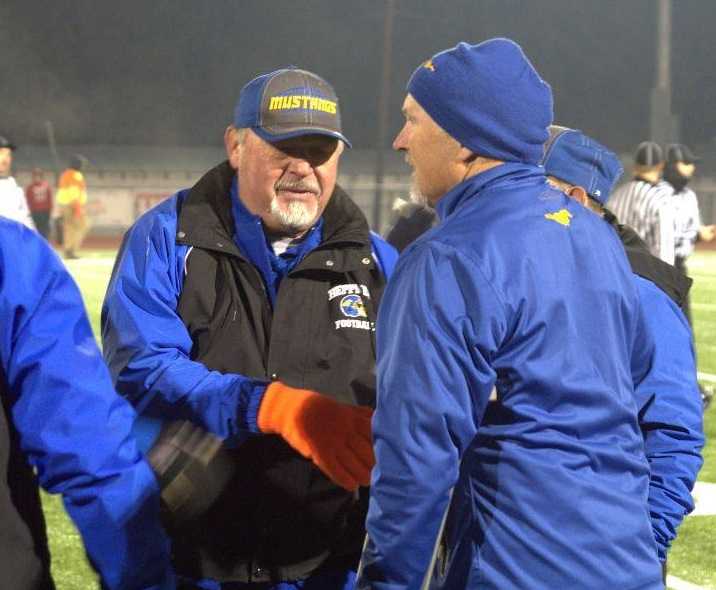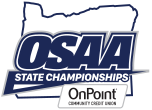
Nearly three decades ago, Les Payne reached a crossroads.
Payne had coached in Heppner’s football program for 13 seasons, assisting four head coaches, and he wasn’t sure if he wanted to continue when Greg Grant took over in 1990.
“I had been at it for a while, and I thought, ‘Maybe I just need to be a teacher,’” Payne said. “Greg came in, young guy, energetic. It kind of revived me a little bit. Since then, it’s just been a fun ride.”
And a highly successful one, too. Payne has been Grant’s right-hand man for the past 29 seasons, helping shape one of the state’s top small-school programs. Under Grant and Payne, the Mustangs have won 256 games and two state titles (1992, 2015).
“When people talk about our program, my name probably comes up a little bit too often,” said Grant, who at 293-73 is No. 6 on the state’s all-time wins list. “The people that really know it, it’s like Grant-Payne. I don’t think I’m any more responsible than he is. I might make a few more decisions, but everything we do, we work together.”
Payne -- a defensive coordinator and offensive line coach who is renowned for his meticulous organizational skills, in particular in managing the equipment – has been a part of 329 wins in 42 seasons at 2A Heppner, including one year as the head coach (1983).
Grant has such high regard for Payne he made a command decision in 2008 to name Heppner’s field after him.
“I just wasn’t going to wait for him to die,” Grant said of Payne. “I just said, ‘I’m not going to ask anybody’s permission because I don’t want it to get political.’ But the powers-that-be said, ‘No, this is a great idea. There’s no one more deserving.’
“So he lines Les Payne Field and he coaches on Les Payne Field.”
Payne played at Auburn High School in the Seattle area and at Yakima Community College and Eastern Washington University, where he was a guard on the 1967 NAIA national runner-up team.
He coached for nine seasons in Tonasket, Wash. (1968-76), the first seven as head coach, before heading to Heppner in 1977 as an assistant coach for girls basketball and baseball.
He showed up at football practice one day, helped out the offensive line coach and ended up working the rest of the 1977 season as a volunteer. He became a paid assistant in 1978, and five years later, he agreed to fill in as head coach for one season, just to get the program out of a tight spot.
“I said, ‘Next year you’ve got to find somebody,’” Payne said.
Three more coaches came and went at Heppner. When Grant arrived in 1990 from Alsea, Payne could see they shared a similar intensity.
“I tell people that before Greg showed up, I was the guy who was the ranter and raver, who got things fired up,” Payne said. “All of the sudden Greg came along and I was like, ‘Oh, I don’t have to do that anymore.’ We just meshed.”
Grant recalled when he first learned of Payne.
“My first question was, ‘Why doesn’t he want the job?’” Grant said. “He had been the head coach for one year and it didn’t fit his personality. He said that he just wanted to coach football and work with the kids.”
Payne assumed the role of organizer, taking the initiative to send out letters to players after Grant was hired late in the summer, alerting them to get ready for practices.
“Since then, it’s just been my thing,” Payne said.
Payne’s organizational skills are unparalleled. Mark Elmblade of Armorzone Athletic, which supplies Heppner with gear, carries photos of the Mustangs’ equipment room to show other schools as an example.
“Les is one of the best as far as organization and knowledge of the product,” Elmblade said. “Les is fantastic. I don’t have any other coaches that have the luxury of having a Les Payne help them with equipment. I wish we could duplicate him everywhere.”
Heppner has thrived with Grant coordinating the offense and Payne running the defense, even if Grant’s gambling nature sometimes puts undue pressure on Payne.
“I don’t think there’s a more patient guy in the world,” Grant said. “I don’t know how many times I’ve onside kicked it and gone for it on fourth down, and he’s never said a darn thing to me, even though he might grit his teeth to me.”
Payne has learned how to cope with Grant’s style.
“Early on, I’m thinking, ‘What’s with this guy?’” Payne said. “But you just get used to it. You know what’s coming.”
Grant tricked Payne in 2008, however, by secretly organizing a ceremony to name the field after him at the team’s season opener. With Payne’s family members and former coaching colleagues in attendance, the school revealed the honor during pre-game announcements.
Payne was getting ready for the game -- wearing headphones and not listening to the announcer – when his son, Kevin, an assistant coach at the time, alerted him.
“He said, ‘You better listen to this,’” Payne said. “That’s the first time I knew. I had no clue. I’m still not sure why they did it. It was kind of an emotional thing. I had brothers and sisters from the Seattle area there, and I had no idea they were even in town.”
Grant and Payne have been so successful together in part because they have a similar philosophy on running a football program, according to Grant. They don’t get burned out because they don’t let it become a year-round obsession.
“It’s a seasonal thing,” Grant said. “We kind of walk away from it for a while, and then come back to it. We love this size and type of community. It’s a great place to coach football. I’ve never had a coaches meeting. I don’t know why we would. We’ll visit about some things and we’ll talk about some things, but we never made it a job.”
So how much longer will Payne, 74, continue coaching?
“It’s year to year,” said Payne, who is retired from teaching and commutes one hour from his home in Umatilla to Heppner. “We’ll see how I feel come next spring. One of these years I’m going to have to quit.”
Grant isn’t ready for that day to arrive.
“I tell him we have a lifetime contract,” Grant said. “So far, it’s worked.”
















